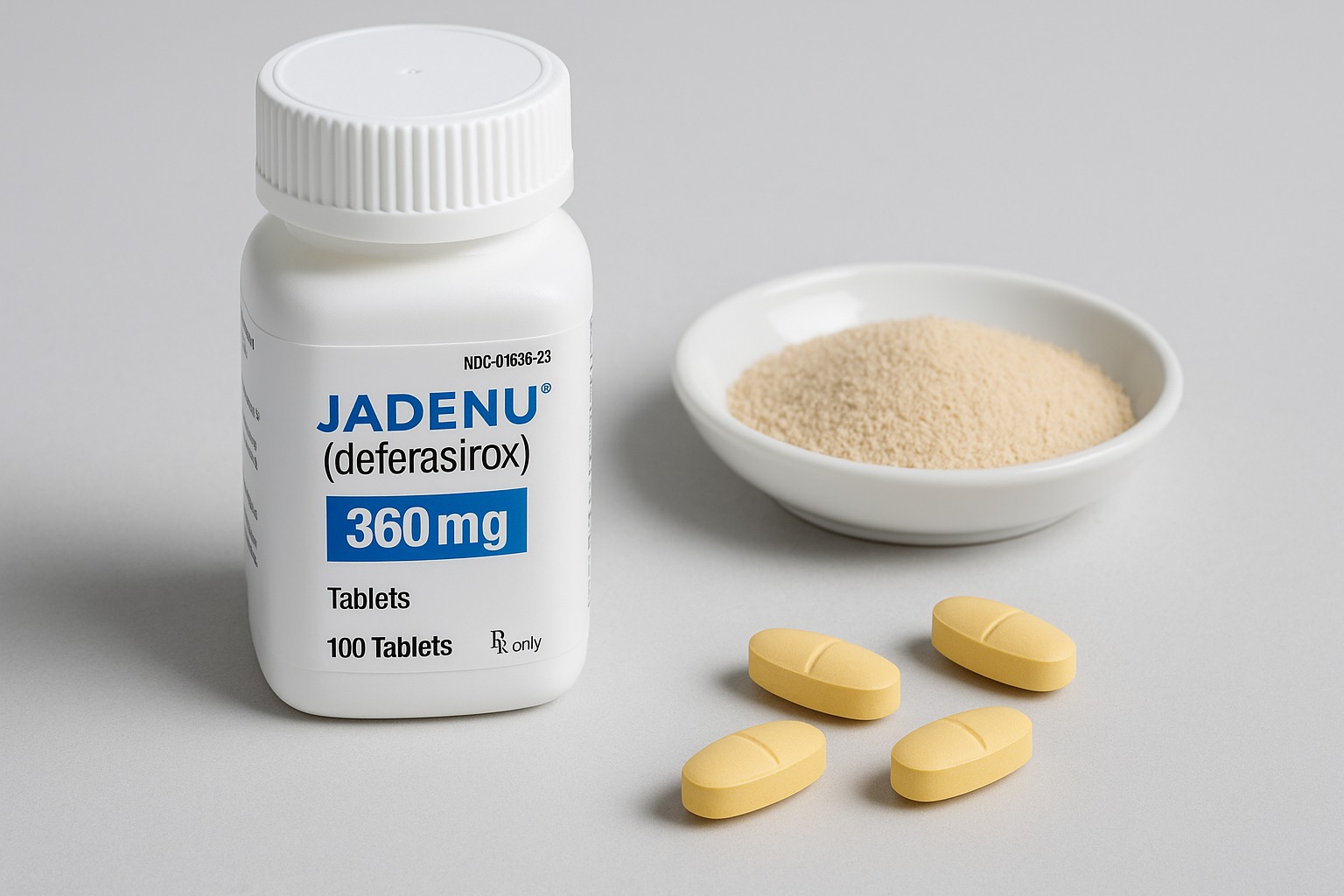Jadenu (deferasirox) is a prescription medicine used to lower iron levels in people with chronic iron overload. This condition often develops in patients who receive frequent blood transfusions for diseases like thalassemia, sickle cell anemia, or certain other chronic anemias. By reducing excess iron, Jadenu helps protect vital organs such as the heart, liver, and pancreas from long-term damage.
In this easy-to-read guide, you’ll learn what Jadenu is, how it works, when doctors prescribe it, how to take it safely, possible side effects, precautions, and answers to some of the most common questions people search online.
Quick disclaimer: This article is for educational purposes only and not a substitute for professional medical advice. Always follow your doctor’s or healthcare provider’s instructions.
What is Jadenu?
Jadenu (active ingredient: deferasirox) belongs to a class of medicines called iron chelators. It works by binding to excess iron in the body and allowing it to be removed naturally, mainly through the stool.
Jadenu is available in two main forms:
- Jadenu tablets (film-coated, taken with or without a light meal)
- Jadenu Sprinkle granules (mixed with soft food or liquids, usually for those who have difficulty swallowing tablets)
It is often prescribed as a more convenient alternative to Exjade, another deferasirox-based medication.
Warnings
- Follow all directions on your prescription label and instructions provided by your healthcare team.
- Do not change your dose or stop taking Jadenu unless instructed by your doctor.
- Jadenu may cause serious liver, kidney, or gastrointestinal side effects in some patients. Regular monitoring with blood tests is required.
Seek medical attention right away if you experience symptoms such as severe stomach pain, blood in stools, vomiting blood, yellowing of skin/eyes, or unusual tiredness.
Before taking Jadenu
Do not take Jadenu if you are allergic to deferasirox or any of its ingredients.
Tell your doctor if you have ever had:
- Kidney problems
- Liver disease
- Stomach ulcers or intestinal bleeding
- Hearing or vision problems
- Low blood counts
Pregnancy and breastfeeding:
- It is not known if Jadenu harms an unborn baby. Inform your doctor if you are pregnant or planning pregnancy.
- Breastfeeding is not recommended while using this medicine.
Children: Jadenu may be prescribed for children over 2 years old with transfusional iron overload. Dosing is carefully adjusted by weight.
How do I take Jadenu?
- Take Jadenu exactly as prescribed by your doctor.
- It can be taken with or without a light meal, but try to take it the same way each day.
- Swallow the tablets whole with water. Do not crush or chew.
- For Jadenu Sprinkle granules, mix them with soft food (like applesauce or yogurt) or liquid, and take immediately.
Important tips:
- Drink plenty of fluids during treatment.
- Keep up with regular blood tests to monitor iron levels, liver, and kidney function.
- Your doctor may adjust your dose based on ferritin (iron) test results.
What happens if I miss a dose?
Take the missed dose as soon as you remember. If it is almost time for your next dose, skip the missed dose. Do not take two doses at the same time.
What happens if I overdose?
Seek emergency medical help or call your local poison control center immediately. Overdose may cause severe stomach pain, vomiting, diarrhea, kidney or liver injury.
What should I avoid while taking Jadenu?
- Avoid high-fat meals, as they may increase side effects.
- Do not use aluminum-containing antacids (like Maalox) at the same time as Jadenu.
- Avoid alcohol, which may increase the risk of liver damage.
What are the side effects of Jadenu?
Serious side effects (seek help immediately):
- Severe stomach pain, black/tarry stools, or vomiting blood
- Yellow skin/eyes (jaundice), dark urine
- Swelling of legs, shortness of breath
- Decreased urination
- Sudden vision or hearing changes
Common side effects may include:
- Nausea, vomiting, or diarrhea
- Stomach pain
- Skin rash
- Headache
- Increased liver enzymes in blood tests
This is not a complete list of side effects. Report unusual symptoms to your doctor.
Drug interactions
Tell your doctor about all medicines you use, including over-the-counter drugs, vitamins, and herbal supplements.
Notable interactions include:
- Other iron chelators (risk of toxicity)
- NSAIDs (ibuprofen, naproxen) or corticosteroids (higher bleeding risk)
- Anticoagulants like warfarin
- Certain seizure medications (like phenytoin)
Storage
- Store Jadenu at room temperature, away from moisture and heat.
- Keep it out of reach of children.
Popular FAQ
Is Jadenu the same as Exjade?
Both contain deferasirox, but Jadenu is easier to take because it can be swallowed directly, while Exjade tablets must be dissolved in liquid.
How long do I need to take Jadenu?
Treatment is long-term and depends on your iron levels. Many patients take it for months or years, with dose adjustments based on regular monitoring.
Does Jadenu cure thalassemia or sickle cell disease?
No. Jadenu does not cure the underlying disease; it only manages iron overload from blood transfusions.
Can children take Jadenu?
Yes, but only if prescribed by a doctor, with careful dose adjustments and monitoring.
Final Thoughts
Jadenu is an important medicine for managing chronic iron overload and preventing organ damage in patients who need regular blood transfusions. While highly effective, it requires close monitoring to avoid serious side effects.
Always take Jadenu exactly as prescribed, keep up with regular blood tests, and report any concerning symptoms to your healthcare provider.


Hi there, just became alert to your blog through Google, and found that it’s really informative. I am going to watch out for brussels. I’ll appreciate if you continue this in future. Many people will be benefited from your writing. Cheers!